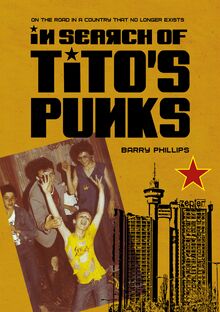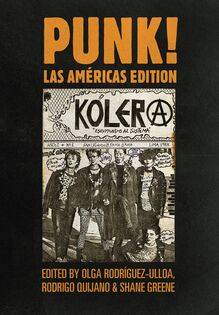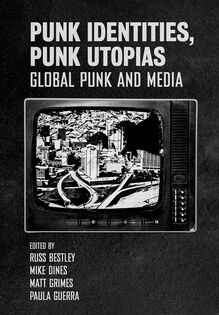-
 Univers
Univers
-
 Ebooks
Ebooks
-
 Livres audio
Livres audio
-
 Presse
Presse
-
 Podcasts
Podcasts
-
 BD
BD
-
 Documents
Documents
-
- Cours
- Révisions
- Ressources pédagogiques
- Sciences de l’éducation
- Manuels scolaires
- Langues
- Travaux de classe
- Annales de BEP
- Etudes supérieures
- Maternelle et primaire
- Fiches de lecture
- Orientation scolaire
- Méthodologie
- Corrigés de devoir
- Annales d’examens et concours
- Annales du bac
- Annales du brevet
- Rapports de stage
La lecture à portée de main
Vous pourrez modifier la taille du texte de cet ouvrage
Découvre YouScribe en t'inscrivant gratuitement
Je m'inscrisDécouvre YouScribe en t'inscrivant gratuitement
Je m'inscrisEn savoir plus
Vous pourrez modifier la taille du texte de cet ouvrage
En savoir plus

Description
This new collection is the second in the Global Punk series. Following the publication of the first volume the series editors invited proposals for a second volume, and selected contributions from a range of interdisciplinary areas, including cultural studies, musicology, ethnography, art and design, history and the social sciences.
This collection extends the theme into new territories, with a particular emphasis on contemporary global punk scenes, post-2000, reflecting upon the notion of origin, music(s), identity, careers, membership and circulation.
This area of subcultural studies is far less documented than more ‘historical’ work related to earlier punk scenes and subcultures of the late 1970s and early 1980s. This new volume covers countries and regions including New Zealand, Indonesia, Cuba, Ireland, South Africa, Siberia and the Philippines, alongside thematic discussions relating to trans-global scenes, the evolution of subcultural styles, punk demographics and the notion of punk identity across cultural and geographic boundaries.
The book series adopts an essentially analytical perspective, raising questions over the dissemination of punk scenes and their form, structure and contemporary cultural significance in the daily lives of an increasing number of people around the world.
This book has a genuine crossover market, being designed in such a way that it can be adopted as an undergraduate student textbook while at the same time having important currency as a key resource for established academics, postdoctoral researchers and PhD students.
In terms of the undergraduate market for the book, it is likely that it will be adopted by convenors of courses on popular music, youth culture and in discipline areas such as sociology, popular music studies, urban/cultural geography, political history, heritage studies, media and cultural studies.
Introduction
1. Yes, But Is It Punk?
Mark Edward Achtermann
2. Re-thinking punk discourse and purpose: A case study of Muslim Punk in Java
Elise Papineau
3. 'Mutants of the 67th parallel north': Punk performance and the transformation of everyday life
Hilary Pilkington
4. Looking beyond music: Curating and narrating punk subculture in Singapore
Kai Khiun Liew and J. Patrick Williams
5. Taurunga music sux! DIY punk culture in Aotearoa
Kyle Barrett and Wairehu Grant
6. Filipino-American punk
Junior Tidal
7. Punk space in Bandung, Indonesia: Evasion and confrontation
Jim Donaghey and Frans Ari Prasetyo
8. Welcome to the 'modern age': The imagery of punk from the 1970s in the redefinition of the New York music scene of the 2000s and beyond
Paula Guerra and Thiago Pereira Alberto
9. Going through the motions: Punk nostalgia and conformity
Russ Bestley
10. Always now: Punk in Washington, DC, 2010–19
John R. Davis
11. Punk's not dead but its organs are being harvested in Ireland
Michael Mary Murphy
12. From punk rock to Prabhupāda: Locating the musical, philosophical and spiritual journey of contemporary Krishnacore
Mike Dines
13. Gore, absurdity and injustice: Narco aesthetics as local transgressions in grind and power violence: A perspective from Mexico's musical subcultures
José Omar González Hernández
14. Fuck off! Fokofpolisiekar's Afrikaans punk in the postcolony
Schalk D. van der Merwe
15. So far, so close: Contemporary faces of Portugese and Brazilian punk scenes
Paula Guerra and Pedro Menezes
Author Biographies
Index
Sujets
Informations
| Publié par | Intellect Books |
| Date de parution | 15 février 2021 |
| Nombre de lectures | 0 |
| EAN13 | 9781789383393 |
| Langue | English |
| Poids de l'ouvrage | 10 Mo |
Informations légales : prix de location à la page 0,1750€. Cette information est donnée uniquement à titre indicatif conformément à la législation en vigueur.
Extrait
First published in the UK in 2021 by Intellect, The Mill, Parnall Road, Fishponds, Bristol, BS16 3JG, UK
First published in the USA in 2021 by Intellect, The University of Chicago Press, 1427 E. 60th Street, Chicago, IL 60637, USA
Copyright © 2021 Intellect Ltd
Produced in collaboration with the Punk Scholars Network
All rights reserved. No part of this publication may be reproduced, stored in a retrieval system or transmitted, in any form or by any means, electronic, mechanical, photocopying, recording or otherwise, without written permission.
A catalogue record for this book is available from the British Library.
Copy editor: MPS Technologies
Cover designer: Russ Bestley
Indexing: Otto Sompank
Production manager: Emma Berrill
Typesetting: Russ Bestley
Part of the Global Punk series
ISSN 2632-8305 | ONLINE ISSN 2632-8313
Print ISBN 978-1-78938-337-9
ePDF ISBN 978-1-78938-338-6
ePUB ISBN 978-1-78938-339-3
Printed and bound by Hobbs
To find out about all our publications, please visit
www.intellectbooks.com
There, you can subscribe to our e-newsletter, browse or download our current catalogue and buy any titles that are in print.
This is a peer-reviewed publication.
CONTENTS
INTRODUCTION: TRANS-GLOBAL PUNK SCENES: FURTHER REFLECTIONS
RUSS BESTLEY, MIKE DINES, ALASTAIR ‘GORDS’ GORDON & PAULA GUERRA
1 . YES, BUT IS IT PUNK?
MARK EDWARD ACHTERMANN
2 . RE-THINKING PUNK DISCOURSE AND PURPOSE: A CASE STUDY OF MUSLIM PUNK IN JAVA
ÉLISE IMRAY PAPINEAU
3 . ‘MUTANTS OF THE 67 TH PARALLEL NORTH’: PUNK PERFORMANCE AND THE TRANSFORMATION OF EVERYDAY LIFE
HILARY PILKINGTON
4 . LOOKING BEYOND MUSIC: CURATING AND NARRATING PUNK SUBCULTURE IN SINGAPORE
KAI KHIUN LIEW & J. PATRICK WILLIAMS
5 . TAURANGA MUSIC SUX! DIY PUNK CULTURE IN AOTEAROA
KYLE BARRETT & WAIREHU GRANT
6 . FILIPINO-AMERICAN PUNK
JUNIOR TIDAL
7 . PUNK SPACE IN BANDUNG, INDONESIA: EVASION AND CONFRONTATION
JIM DONAGHEY & FRANS ARI PRASETYO
8 . WELCOME TO THE ‘MODERN AGE’: THE IMAGERY OF PUNK FROM THE 1970 S IN THE REDEFINITION OF THE NEW YORK MUSIC SCENE OF THE 2000 S AND BEYOND
PAULA GUERRA & THIAGO PEREIRA ALBERTO
9. GOING THROUGH THE MOTIONS: PUNK NOSTALGIA AND CONFORMITY
RUSS BESTLEY
10 . ALWAYS NOW: PUNK IN WASHINGTON DC, 2010–19
JOHN R. DAVIS
11 . PUNK’S NOT DEAD BUT ITS ORGANS ARE BEING HARVESTED IN IRELAND
MICHAEL MARY MURPHY
12 . FROM PUNK ROCK TO PRABHUPĀDA: LOCATING THE MUSICAL, PHILOSOPHICAL AND SPIRITUAL JOURNEY OF CONTEMPORARY KRISHNACORE
MIKE DINES
13 . GORE, ABSURDITY AND INJUSTICE: NARCO AESTHETICS AS LOCAL TRANSGRESSIONS IN GRIND AND POWERVIOLENCE: A PERSPECTIVE FROM MEXICO’S MUSICAL SUBCULTURES
JOSÉ OMAR GONZÁLEZ HERNÁNDEZ
14 . FUCK OFF! FOKOFPOLISIEKAR’S AFRIKAANS PUNK IN THE POSTCOLONY
SCHALK D. VAN DER MERWE
15 . SO FAR, SO CLOSE: CONTEMPORARY FACES OF PORTUGUESE AND BRAZILIAN PUNK SCENES
PAULA GUERRA & PEDRO MENEZES
AUTHOR BIOGRAPHIES
INDEX
TRANS-GLOBAL PUNK SCENES: FURTHER REFLECTIONS
Following the publication of The Punk Reader: Research Transmissions from the Local and the Global (2019), this is the second volume in a series of books on the theme of ‘global punk’. While the editors have always acknowledged the enormity of the subject (and make no attempt to detail every punk and punk-inspired scene around the world), we recognized that the first volume was simply a small step into a much larger field. From that point we worked with our publisher, Intellect Books, to commission research from other regions and disciplines for inclusion in two further volumes in the series. Consequently, the Global Punk series editors – Russ Bestley, Mike Dines, Alastair Gordon and Paula Guerra – selected contributions from a range of interdisciplinary areas, including cultural studies, musicology, ethnography, art and design, history and the social sciences, for this current volume on post-2000 global punk ‘scenes’, reflecting upon the notion of origins, music(s), identity, careers, membership and circulation. Adopting an essentially analytical perspective, this collection raises questions over the dissemination of punk scenes and their form, structure and contemporary cultural significance in the daily lives of an increasing number of people around the world.
The editors are also aware of the selectivity of the term ‘global’ and the need for further research in the field to include a wider range of themes, countries, cultures, regions and territories (Tomlinson 1991, 2004). While the first two Global Punk books are broadly focused on regional punk scenes, the third book in the series, Punk Identities, Punk Utopias: Global Punk and Media , will explore the impact of digital media along with key issues of identity, inclusion and exclusion in relation to contemporary global punk. It is hoped that the books in this series will add to academic discussion of contemporary popular culture, particularly in relation to punk scenes and the critical understanding of transnational and cross-cultural dialogue. This work, therefore, draws upon a growing body of research in the field (Bestley et al. 2019 ; Dunn 2016; Astley 2014 ; Gololobov 2012 ; Steinholt 2012 ; Guerra 2015 ; Guerra and Bennett 2015 ; Boehlke and Gericke 2007 ; Bennett and Guerra 2018) and, we hope, offers new insights and opportunities for further research.
The first volume in the Global Punk series covered research into a range of diverse punk scenes in the Netherlands, Portugal, Mexico, Brazil, Spain, Canada, Iran, Indonesia, Malaysia and China, together with a critical reflection on complex areas of study such as the nature of lifelong subcultural identity and authenticity. This second volume reflects a range of current and timely research on contemporary punk scenes in Java, Siberia, Singapore, New Zealand, the Philippines, Indonesia, the United States, the United Kingdom, Ireland, Mexico, South Africa, Portugal and Brazil, along with a study of the international Krishnacore movement. These chapters are situated within the context of thematic discussions relating to trans-global scenes, the evolution of subcultural styles, punk demographics and the notion of punk identity across cultural and geographic boundaries. Trans-Global Punk Scenes: The Punk Reader Vol.2 adopts a particular emphasis on contemporary scenes, post-2000, an area of subcultural studies less documented than more ‘historical’ work related to earlier punk scenes and subcultures of the late 1970s and early 1980s.
As Mark Edward Achtermann notes in the first chapter of this volume, punk has always been frustratingly vague in practice. In the mid-1970s, a disparate range of popular music groups became associated with a new ‘movement’, which was subsequently termed ‘punk’ as much by marketing and promotions teams and music journalists as by the (often reluctant) musicians themselves. In fact, similar musical and stylistic developments were happening around the world, but the term ‘punk’ was largely only applied within the United States and the United Kingdom, in turn defining those places as the etymological point of origin for a new wave of music, fashion, design and subcultural practice. The evolution of heavily politicized hardcore punk scenes from the early 1980s on, as something of a counterpoint to the commercial success of the ‘new wave’ and punk’s co-option into the mainstream music industry, led to a narrowing of the field of punk in practice. The aesthetics of ‘authentic’ punk became more tightly defined among participants in international hardcore scenes while, ironically, the adjective ‘punk’ filtered into mainstream discourse as a byword for something vaguely rebellious, radical or beyond the norm; from punk archaeology to punk cinema, punk literature, punk gardening and punk aerobics.
This dynamic presents something of a dilemma for those studying global punk scenes. Are these communities bounded by their connection to the visual and musical aesthetic of a widely recognized international hardcore/punk style, or are they deemed ‘punk’ for want of a better term simply because they step away from more regular, or more commercial, frames of reference? In short, is it ‘punk’ because it looks ‘punk’? Because it adheres to a narrow set of stylistic conventions often drawn from an early 1980s UK stereotype of bands such as the Exploited, Charged GBH and Abrasive Wheels, a scene latterly termed UK82? Or is it punk because it presents a challenge to mainstream hierarchies and cultural practices? In that case any and everything ‘counter-cultural’ might be wrapped into the same definition and punk becomes a simple byword for ‘radical’, ‘edgy’ or ‘alternative’ (and a useful marketing and branding term for youth-centred products). In part, this dilemma reflects the process of adoption across cultures and countries – whereby a style and a subculture is taken up by participants in a different place – and adaptation – where those styles become more closely assimilated within the new host culture, taking on aspects of local traditions, language and practice to create a new scene and a range of culturally specific new styles. Such questions are at the heart of our approach to the Global Punk book series, particularly when looking into the rear-view mirror of punk’s 40-plus year history and the relevance of punk today as a subculture, a range of specific scenes, a lifestyle, a marketing concept, a philosophy or an identity.
We kick things off with a critical reflection on the relevance of the term ‘punk’ in a contemporary global context. Mark Edward Achtermann explores the effect of the global expansion of punk on the definition of the term ‘punk’. Achtermann suggests that one of the difficulties of definition is that words are ‘moving targets’: for instance, as the range of examples of ‘punk’ increases, so too the lexical definition of the term ‘punk’ must change to accommodate the new examples. He goes on to argue that the confrontational quality of punk is
-
 Univers
Univers
-
 Ebooks
Ebooks
-
 Livres audio
Livres audio
-
 Presse
Presse
-
 Podcasts
Podcasts
-
 BD
BD
-
 Documents
Documents
-
Jeunesse
-
Littérature
-
Ressources professionnelles
-
Santé et bien-être
-
Savoirs
-
Education
-
Loisirs et hobbies
-
Art, musique et cinéma
-
Actualité et débat de société
-
Jeunesse
-
Littérature
-
Ressources professionnelles
-
Santé et bien-être
-
Savoirs
-
Education
-
Loisirs et hobbies
-
Art, musique et cinéma
-
Actualité et débat de société
-
Actualités
-
Lifestyle
-
Presse jeunesse
-
Presse professionnelle
-
Pratique
-
Presse sportive
-
Presse internationale
-
Culture & Médias
-
Action et Aventures
-
Science-fiction et Fantasy
-
Société
-
Jeunesse
-
Littérature
-
Ressources professionnelles
-
Santé et bien-être
-
Savoirs
-
Education
-
Loisirs et hobbies
-
Art, musique et cinéma
-
Actualité et débat de société
- Cours
- Révisions
- Ressources pédagogiques
- Sciences de l’éducation
- Manuels scolaires
- Langues
- Travaux de classe
- Annales de BEP
- Etudes supérieures
- Maternelle et primaire
- Fiches de lecture
- Orientation scolaire
- Méthodologie
- Corrigés de devoir
- Annales d’examens et concours
- Annales du bac
- Annales du brevet
- Rapports de stage













